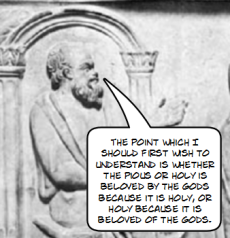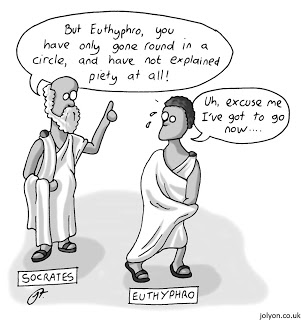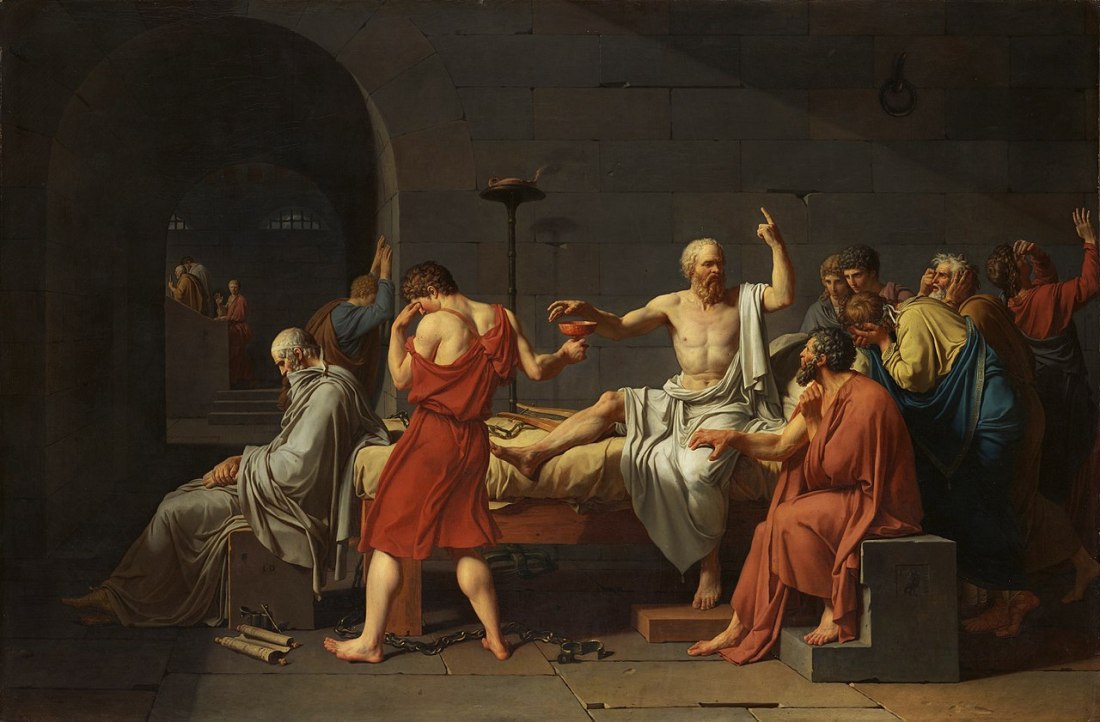
Before you read this post, have you read about part 1 and part 2 of the Phaedo?
Socrates is in prison awaiting his death, and like the committed philosopher he is has chosen to spend his final hours engaging his friends in a discussion about the immortality of the soul and the afterlife. Hoping to go to a good afterlife himself, Socrates has presented some tricky and rather controversial arguments for the immortal soul, the forms, and the idea of learning as recollection. In his final hours, he now digresses in mythological terms about what he thinks actually happens to the soul in the afterlife, and how the universe is constructed, after which he bids his friends goodbye. Here in the Phaedo, Plato is at his weirdest: and also (towards the end of the dialogue) his most poignant!
Phaedo digested (part 3)
Socrates: Well if my arguments for the immortality of the soul are anything to go by, it should matter a lot what happens to the soul in life as well as death! If the soul has to be pure in order to go to a good afterlife, we need to take care of it in this life. This is handy, as it means that bad people get the punishments they deserve, and good people get their rewards. Surely one of the most psychologically fundamental notions in all of humankind!
So what happens exactly to the soul after death, depending on whether it had a pure life? Well, the myth goes that a person dies, their guardian spirit (or angel) leads him or her to a kind of judgement place, like a court, where their fate will be decided. After this, they are guided on the path to the underworld, and after having served their time, a bit like in prison, they return. The path between here and the underworld has many forks though, I think, and it’s important for souls to follow their guides along the right path. Those that ignore their guides and cling on to the physical world, with all its pleasures and distractions, and engage in bad behaviour will wander for a long time before reaching its destination. Those of a pure soul who have lived a pure and moderate life, however, will be guided to a good place.
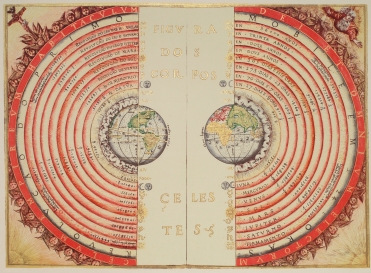
There are many strange places that souls can go; and there are many strange places on the Earth too! Humour me whilst, in my final minutes, digress about how the universe is put together. The earth, by my reckoning, stands at the very centre of the cosmos, and this is why it stands still, and doesn’t need anything (like air, of whatever) to keep it in place. Furthermore, the earth is very large and sits with the stars within the mysterious substance called the ‘ether’. We actually dwell in the ‘hollows’ of the earth, you know, but mistakenly think we live on its surface. We think of the atmosphere, the air, as beyond the earth, but it is actually a part of it. The heavens, which lie far beyond the atmosphere itself, are infinitely more beautiful than the sky we see. We live like deluded creatures, not seeing clearly the nature of the world or the heavens, but believing that what we see around us is all there is.
Simmias: That’s a nice image, Socrates. This idea that we don’t see the world for how it really is, and are mistaken about the nature of things…. it reminds me of what you said in The Republic, when you spoke about the allegory of the cave…
Socrates: We will get on to that one in a later blog post! For now, let me continue my account of the heavens and the earth. When looked at from space, the earth is a colourful, spherical ball. Much that is beautiful grows on the earth: all of nature’s glories cover it. Just watch any of David Attenborough’s excellent nature documentaries if you don’t agree! The earth is also covered with living creatures on land, in the air and in the sea. But just as we live on land surrounded by sea, there are even people who live on islands surrounded by air. They are like a race of supermen; they have no disease, and can see the heavens for what they really are.
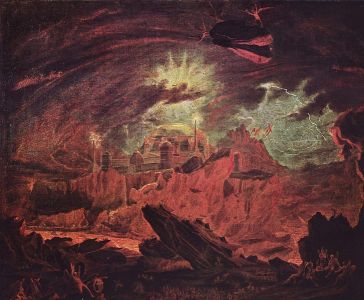
What about below the earth’s surface? Well I’ve heard that there are all these interconnected rivers of fire beneath us, all of which are interconnected, and lead into a giant pit which Homer calls ‘Tartarus.’ – a terrible place. The Titans are imprisoned down there, you know. The rivers above the earth are all connected to Tartarus too, via a large and mysterious underground lake called Acherusia. One of the rivers that flow into this lake is the Styx, which you may already have heard of.
So if you believe this account I have given of the earth, it seems that there is much more to existence than meets the eye: in fact you can believe this without subscribing to the mythological account I have just given.
Simmias: That’s…. all a bit weird Socrates. I’m not sure I agree (or understood!) all of it. But tell me: how does this mythical account of the earth that you just outlined link to what you were saying before about the afterlife?
Socrates: I’m glad you asked! Let’s get back to the dead, and their journey to the afterlife with their guardian angel, or guide. They’re being judged. The ones who have led an average life go and chill in Acherusia (that lake) for a bit, until they have been purified more. It’s a bit like purgatory in Catholic Christianity. Most people go here. However, the people who have led such wicked lives, however, that they cannot be redeemed (murderers, rapists and the like) are HURLED into Tartarus (that big pit I was telling you about) and stay down there. Those who are criminals, but aren’t THAT bad (for example, those guilty of crimes of passion) get chucked into Tartarus but one year later get magically swept back out again and back to the lake. Once there, they have to convince the souls of their victims to forgive them… otherwise they get put back in Tartarus again! It’s a neat little system, if you think about it!
Simmias: Riiight…..
Socrates: Finally, those who have led a holy and virtuous life are freed from the earth altogether. They go to that pure place I was telling you about, with no disease and superhuman people. The philosophers go to a particularly good part of this place: they live in this unimaginably beautiful place, with no bodies: perhaps a bit like Buddhist Nirvana! There’s not point trying to describe what it’s like though; you have to be there to understand.
Simmias: Socrates, after listening to all of this, I’m starting to think you’ve been smoking the waccy baccy again…
Socrates: Not so, Simmias! Let’s be honest: no sensible man would ACTUALLY insist that the myth I have described is the definite truth, but it’s worth taking the risk and believing it, I think, or something like it. We’ve all agreed that the soul is immortal, so it makes a certain degree of sense to think that something of this sort, good or bad, happens to it after death. I myself am in high spirits about the state of my own soul; I have pursued the pleasures of learning and wisdom to the very end, and have gained virtue. Here’s hoping I go to the good place when I die! Which is any minute now…

[Addressing his friends]: Now then; you will all take this great journey I have described at some point. But my own turn has finally come. I’ll be drinking poison: specifically, hemlock. I’ll have a bath first though: it will save them washing my corpse!
Crito: My dear friend. I tried to persuade you to escape from here, but … here we are, and you have made clear your decision. Do you have any instructions for me, concerning your family or anything else?
Socrates: Nothing, Crito. All I would say is take good care of yourselves: I really mean your souls! Live as I have taught: with integrity and virtue. This is what I want for you and all my friends.
Crito: We will, old friend! But how should we bury you?
Socrates: Any way you like! After I have drunk the poison, you’ll only be burying a lifeless corpse: you won’t be burying ME at all! Tell yourself you are burying ‘Socrates’ body’; Socrates himself, hopefully, will have gone to a better place!
——————————————————————
Phaedo: Well, we’re nearly at the end of our epic story. After Socrates said these things, he and his friends, myself included, stayed on. We discussed all that we had heard and were heartbroken, for we felt we were losing not just a friend but a father as well. After he had bathed, he said his last goodbyes to his family. Soon, the jailer came in to instruct Socrates to drink the poison, but even he had tears in his eyes. ‘You’re not like the other prisoners’ he said to Socrates. ‘You are the noblest and best man to ever come into this prison. You know what I am bound to tell you; I wish you well!’. With that, the jailer left with tears in his eyes.
Socrates: What a nice chap! He’s been nothing but agreeable to me since I came in here. Anyhow, on with the job. Bring me the poison!
Crito: (desperately) Wait, Socrates! The sun has still not set. We have more time… why not sit with us, eat and drink, and spend more time with your loved ones?
Socrates: There is no use in doing this, Crito. I do not cling to life: I have none left, so now is the time to die. Do not refuse me: bring me the poison!
Phaedo: With that, the poison was brought forth by a slave. Socrates asked him what the procedure was. The slave told him that he should drink the hemlock, and then walk around until his legs felt heavy; then he should lie down. He offered the cup to Socrates… and he took it quite cheerfully. There was no hint of change in his expression. Saying a quick prayer to the gods, Socrates drained the cup of poison.
Up to this point, myself and his friends had held back their emotion; but after we saw him drinking the poison, we could do this no longer. I covered my face, and Crito was beside himself. Socrates himself seemed annoyed by this outpouring of emotion, and bid us control ourselves. His words made us feel ashamed, and we checked our tears.
After walking around for a while, and when his legs were heavy, Socrates lay down on his back. He gradually lost the feelings in his feet and legs; and as the numbing coldness crept up his stomach towards his heart, he whispered to Crito his final words: ‘Crito, sacrifice a cockeral to Asclepius, the god of medicine’. Crito promised him he would. ‘Is there anything else, Socrates?’ he asked through the tears. But there was no reply: the great philosopher’s eyes were fixed and unmoving.
Such was the end of our comrade Socrates: a man who, we would say, was of all those we have known the best, and also the wisest and most upright, we have ever known.
——————————————————————
More ideas
What is this weird cosmological myth stuff all about? It makes no sense following on from Plato’s complex philosophical discussion about the soul!
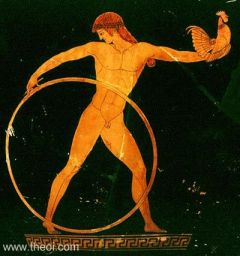
It is unclear how seriously Plato meant his readers to take the mythological proposals at the end of the Phaedo. The dialogue itself is much better known for its arguments concerning the soul, afterlife and forms, which formed the bulk of the dialogue up to this point. However, it is not the only dialogue that consists of serious philosophical discussion quickly followed by mythology; though the transition can seem jarring to modern readers, Plato uses this combination of philosophy and myth in the Republic and the Gorgias, two highly substantial and respected dialogues. Furthermore, his epic work the Timaeus consists almost in its entirety of the kind of seemingly proto-scientific cosmological theorising found first in the Phaedo. Many scholars, like many modern readers, have been tempted to bracket off these myths from ‘Plato’s serious thought’, and treat them as a historical curiosity or otherwise not take them seriously. However, Julia Annas argues that this isn’t the right approach, and suggests that the myths link more closely to the philosophical arguments than have been previously thought; for example, they often serve to add allegorical context or imagery to thoughts expressed in Plato’s philosophy. This can surely be seen in the Phaedo, where Socrates uses the mythological account of the soul’s journey to Tartarus, Acherusia or the heavenly realm as a means of explaining how justice is served in the afterlife. Futhermore, Socrates explicitly states in the dialogue that it would be foolish to assume that his theory represents knowledge of how the afterlife is really like. It’s more likely that Plato is here drawing on the myths of his day to give a mere suggestion of how the afterlife might operate, rather than a literal description. I this vein, it is more satisfying for the modern reader to read the mythical sections of the Phaedo not primarily as comology or proto-science, but an attempt to gesture towards something which Socrates happily admits cannot be fully understood or conceptualised.
Socrates’ last hours: would he have had SUCH a peaceful death?
Socrates has a rather peaceful death as described in the Phaedo (‘euthanasia’ means ‘a good death’ from the Greek). The way Plato, through Phaedo, tells the story of Socrates’ final moments is touching and poignant in the extreme, not just because it relates the death of one of philosophy’s greatest figures, but also because of the manner in which Socrates goes to his death, and the visibly emotional reaction of his friends and the prison jailer. It makes sense in the narrative context of the dialogue for Socrates to pass peacefully to the other side, given what has previously been said about his virtuous life and his supposedly pure soul. However, there is good reason to think that Plato made Socrates’ final hours sound a little more bearable than they might actually have been! Socrates drank hemlock, a poisonous flower whose symptoms, if eaten, include ‘trembling, burning and convulsions.’ Here is more reason to think, therefore, that Plato is not simply giving a straightforward report on what happened, but an idealised account that is consistent with Socrates’ philosophy and beliefs about a good death. Should this trouble us? No; we should not read Phaedo, or indeed any of Plato’s dialogues, as history. They are philosophical and literary creations designed to provoke thought on the biggest questions of philosophy. Still, we might well ask: where is Plato himself in all of this? Being a good friend and student of Socrates, we might expect him to be present in the prison. Phaedo, in part 1 of the dialogue, simply describes Plato as being ‘ill’ on the day Socrates died, which is unfortunate and more than a little mysterious.
Socrates is dead: is that it for Plato Digested?
We started with Plato’s early dialogues, which serve as a great introduction to the character Socrates and follow more of a quasi-historical / narrative structure. Now Socrates the character has been introduced, we can see him as a kind of permanent mouthpiece for Plato’s ideas from now onwards. I will now be working through Plato’s many other dialogues on this blog, which include The Republic, The Symposium and many others, in which Socrates plays a central role. Stay tuned!
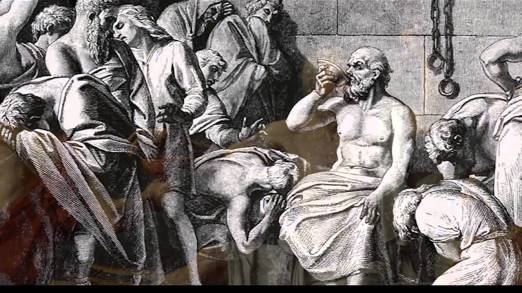
Disclaimer
This dialogue has been abridged and re-worded, with some silly bits added, to make the key arguments more accessible and engaging. It doesn’t represent a totally accurate re-telling of Plato’s original (which can be read here). However, it is designed to preserve the key basic thoughts and arguments, as well as giving a sense of some of the fascinating philosophical issues that Plato addresses in this dialogue.
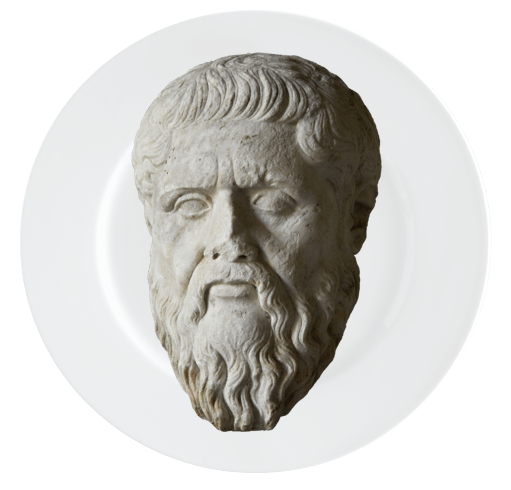




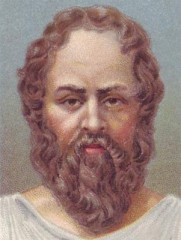
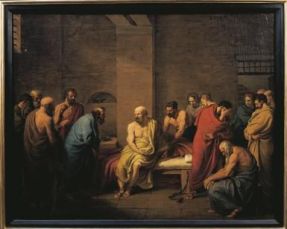 To recap on our previous dialogues, Socrates has been condemned to death for blasphemy and corrupting the youth; furthermore,
To recap on our previous dialogues, Socrates has been condemned to death for blasphemy and corrupting the youth; furthermore, 
 Cebes: This sounds great Socrates, apart from one thing: I’m not convinced about all this talk of your ‘soul.’ Many people think that after death, it is destroyed, and no longer exists: I’d like to hear you prove the existence that the soul continues after death, as your whole view so far depends on this point! And I’m not convinced. And probably neither are the many readers in the 21st Century currently reading this blog!
Cebes: This sounds great Socrates, apart from one thing: I’m not convinced about all this talk of your ‘soul.’ Many people think that after death, it is destroyed, and no longer exists: I’d like to hear you prove the existence that the soul continues after death, as your whole view so far depends on this point! And I’m not convinced. And probably neither are the many readers in the 21st Century currently reading this blog!

 Socrates is about to die by drinking poison in front of all his friends: however, he seems remarkably upbeat. The Phaedo is all about why this is: Socrates seems to be convinced that his soul, which has been purified during his life, is going to be separated from his body when he drinks the poison, and he will therefore go to the
Socrates is about to die by drinking poison in front of all his friends: however, he seems remarkably upbeat. The Phaedo is all about why this is: Socrates seems to be convinced that his soul, which has been purified during his life, is going to be separated from his body when he drinks the poison, and he will therefore go to the  in a separate reality. This is in fact his actual view: there is an immaterial, almost heavenly world out there which we refer to when we say that something is ‘beautiful’ etc. This is one of Plato’s most famous and also most controversial doctrines, and is simply assumed in the Phaedo, rather than formally argued for. In fact, Plato rarely presents any detailed arguments for the forms in all his work, and the doctrine substantially evolved over the course of his writings as well. In Phaedo, the idea of the forms plays a role in establishing the existence of the immortal soul, but in other dialogues, such as the Republic, the forms get focused on in their own right. If it seems like a crazy, unscientific and baffling idea that there could be an eternal, spiritual heaven of abstract objects, it’s worth knowing that Plato himself thought of the world of the forms as a ‘mathematical’ kind of place, rather than a ‘spiritual’ one. Furthermore, he didn’t believe in the Forms as a matter of religious faith (and we are not talking about ‘heaven’ here in a religious sense): he thought that the forms was an idea that could solve all sorts of other philosophical problems about thinking, and also how things in the world have their qualities. We will be discussing the forms much more over the course of this blog!
in a separate reality. This is in fact his actual view: there is an immaterial, almost heavenly world out there which we refer to when we say that something is ‘beautiful’ etc. This is one of Plato’s most famous and also most controversial doctrines, and is simply assumed in the Phaedo, rather than formally argued for. In fact, Plato rarely presents any detailed arguments for the forms in all his work, and the doctrine substantially evolved over the course of his writings as well. In Phaedo, the idea of the forms plays a role in establishing the existence of the immortal soul, but in other dialogues, such as the Republic, the forms get focused on in their own right. If it seems like a crazy, unscientific and baffling idea that there could be an eternal, spiritual heaven of abstract objects, it’s worth knowing that Plato himself thought of the world of the forms as a ‘mathematical’ kind of place, rather than a ‘spiritual’ one. Furthermore, he didn’t believe in the Forms as a matter of religious faith (and we are not talking about ‘heaven’ here in a religious sense): he thought that the forms was an idea that could solve all sorts of other philosophical problems about thinking, and also how things in the world have their qualities. We will be discussing the forms much more over the course of this blog! After the events of the
After the events of the 

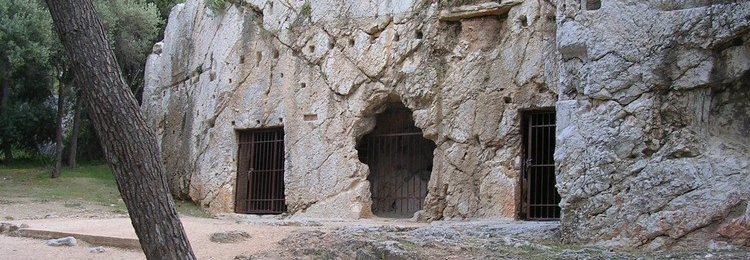
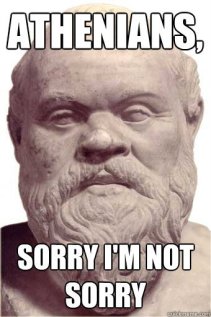
 accept your demand to live a boring, quiet and obedient life,
accept your demand to live a boring, quiet and obedient life, 

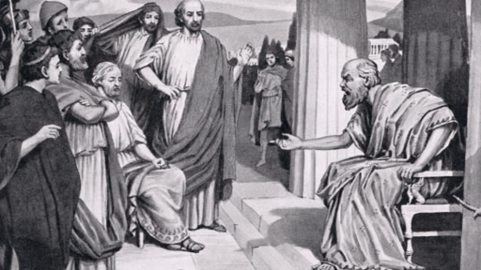
 That’s right: you heard me. Just like Manuel in Fawlty Towers: I know nothing! But I’m very wise though. Perhaps the wisest in the land! You might think I’m boasting, but the Oracle at Delphi said I was the wisest, on behalf of all the gods. And if you don’t believe me, ask my mate Chaerephon. Well, actually you can’t do that because he’s dead … but anyway, ask his brother or something.
That’s right: you heard me. Just like Manuel in Fawlty Towers: I know nothing! But I’m very wise though. Perhaps the wisest in the land! You might think I’m boasting, but the Oracle at Delphi said I was the wisest, on behalf of all the gods. And if you don’t believe me, ask my mate Chaerephon. Well, actually you can’t do that because he’s dead … but anyway, ask his brother or something.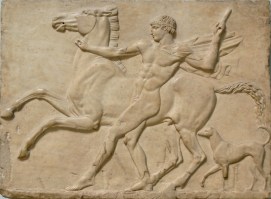
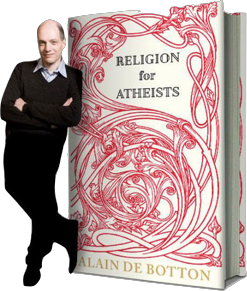 Socrates: Well the idea of an atheist believing in spirits is absurd, since as everybody knows, spirits are the children of the gods! Come to think of it, the idea of an atheist being spiritual at all is itself absurd! Just look at Richard Dawkins: he’s cold inside. And what about
Socrates: Well the idea of an atheist believing in spirits is absurd, since as everybody knows, spirits are the children of the gods! Come to think of it, the idea of an atheist being spiritual at all is itself absurd! Just look at Richard Dawkins: he’s cold inside. And what about 
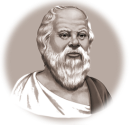 Socrates has been accused of insulting the gods and corrupting the youth of Athens, and seems determined to prove his innocence. He meets his friend Euthyphro, who believes himself to be somewhat of a prophet and a sage when it comes to the nature of the gods. Socrates has a chat with Euthyphro in an attempt to get to the bottom of what the nature of holiness really is, hoping that this knowledge will help him prove his own holiness, and innocence, in court. But it turns out that Euthyphro has a tricky court case of his own, and also that holiness proves annoyingly difficult to define….
Socrates has been accused of insulting the gods and corrupting the youth of Athens, and seems determined to prove his innocence. He meets his friend Euthyphro, who believes himself to be somewhat of a prophet and a sage when it comes to the nature of the gods. Socrates has a chat with Euthyphro in an attempt to get to the bottom of what the nature of holiness really is, hoping that this knowledge will help him prove his own holiness, and innocence, in court. But it turns out that Euthyphro has a tricky court case of his own, and also that holiness proves annoyingly difficult to define….
